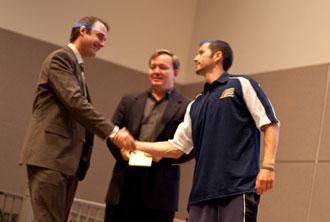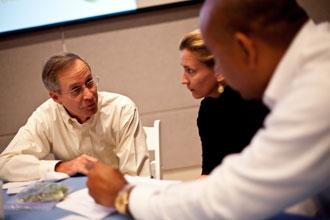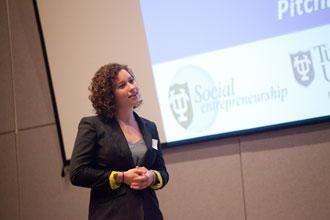Green jobs training program wins top honors at PitchNOLA
Disposing of used cooking oil is an unpleasant cost of doing business for most restaurants, but one local group is turning that task into green—green fuel, green jobs and green cash.

The Gulfsouth Youth Biodiesel Project, which trains inner-city youths to convert used cooking oil into biodiesel fuel, took home first place and a cash prize of $5,000 at the 2010 PitchNOLA competition, an elevator pitch competition for local social entrepreneurship ventures. The event took place Wednesday (Nov. 17) in the Woldenberg Art Center’s Freeman Auditorium on Tulane’s uptown campus.
The competition—a joint presentation of Social Entrepreneurs of New Orleans (SENO), Tulane University’s Social Entrepreneurship Initiatives, the A. B. Freeman School of Business, the Tulane Entrepreneurs Association and the Young Leadership Council—gave 10 social entrepreneurs three minutes each to pitch their ventures before a panel of judges and a live audience of more than 150 people. The judges evaluated the ventures, which ranged from a fleet of eco-friendly taxi cabs to swimming lessons for urban kids, and provided the entrepreneurs with feedback on their ideas and presentations.
The Gulfsouth Youth Biodiesel Project collects used cooking oil from restaurants, which earn a tax deduction for their donations, and sells the clean-burning biodiesel fuel it makes to fleets and distributors, but the project’s true focus is its social mission. The group provides technical training and job skills to out-of-work young people between the ages of 14 and 25, many of them high school dropouts with few alternatives. In addition to gaining valuable skills for the emerging green economy, all graduates of the program earn a certificate from the National Center for Construction Education and Research (NCCER), which qualifies them for a variety of well-paying jobs.

“They’re reaching an audience that can really use the help, they have a sustainable plan and they’re building on things that are already in the market,” said John Elstrott, executive director of the Freeman School’s Levy-Rosenblum Institute for Entrepreneurship and one of this year’s judges. “It was a nice program, and we wanted to give them help.”
Hamilton Simons-Jones, chief development officer at Operation Reach Inc., which runs the Gulfsouth Youth Biodiesel Project, said the cash prize will help the group scale up its training program, but he added that one of the biggest benefits of the competition was the chance to network with other social entrepreneurs.
“There were a couple of people who were finalists that I made sure to get cards from,” said Simons-Jones. “We depend on community support and understanding of our work, so to have such a diverse audience like this is awesome.”
In addition to the Gulfsouth Youth Biodiesel Project, New Orleans Panthers FC, which operates a soccer club for Central City youths funded in part by a community garden that supplies produce to local restaurants, won a prize of $500 for being voted as favorite pitch by audience members.

“We don’t plan on soliciting grants all that much, but if something comes up again, this experience will definitely be a benefit,” said Joel Tilton of New Orleans Panthers FC. “I made some connections and met some interesting people. It’s been a good experience.”
PitchNOLA received nearly 100 entries this year, twice the number it received in 2009. According to Andrea Chen, chair of SENO, that increase speaks to the growth of social entrepreneurship in New Orleans.
“Every year more and more people have ideas, and they’re starting to take action on them because they see all the great examples of people who were just like them,” said Chen. “These are community members who said here’s a problem, I can step up to the plate and solve it and make an impact in my community.”
Funding for this year’s program was provided by Penny Hart, a Tulane parent and member of the Tulane Parents Council.
“I’m an entrepreneur myself and I’ve lived the American Dream, so I love the concept of supporting entrepreneurship,” Hart said. “At the same time, I have three children and I am very concerned about the environment and the future of our earth, so the combination of the two is a really wonderful thing to support.”
Interested in advancing your education and/or career? Learn more about Freeman’s wide range of graduate and undergraduate programs. Find the right program for you.
Recommended Reading
Other Related Articles
- NOLA.com: Louisiana venture capital firms, once an afterthought, are big funders of local startups now
- Forbes: Your Pitch Deck Doesn’t Close the Deal - Your Power in the Room Does
- New Orleans startups bet on AI as Tulane expands its survey statewide in 2026
- Freeman student builds community far from home
- Lepage Center honors graduating fellows
- Newsweek: Jeff Bezos May Sell up to 25M Amazon Shares
- Business Insider: Trump blasting Amazon over tariff transparency is a warning sign for US retailers
- AP News: Amazon is not planning to break out tariff costs online as White House attacks potential move
